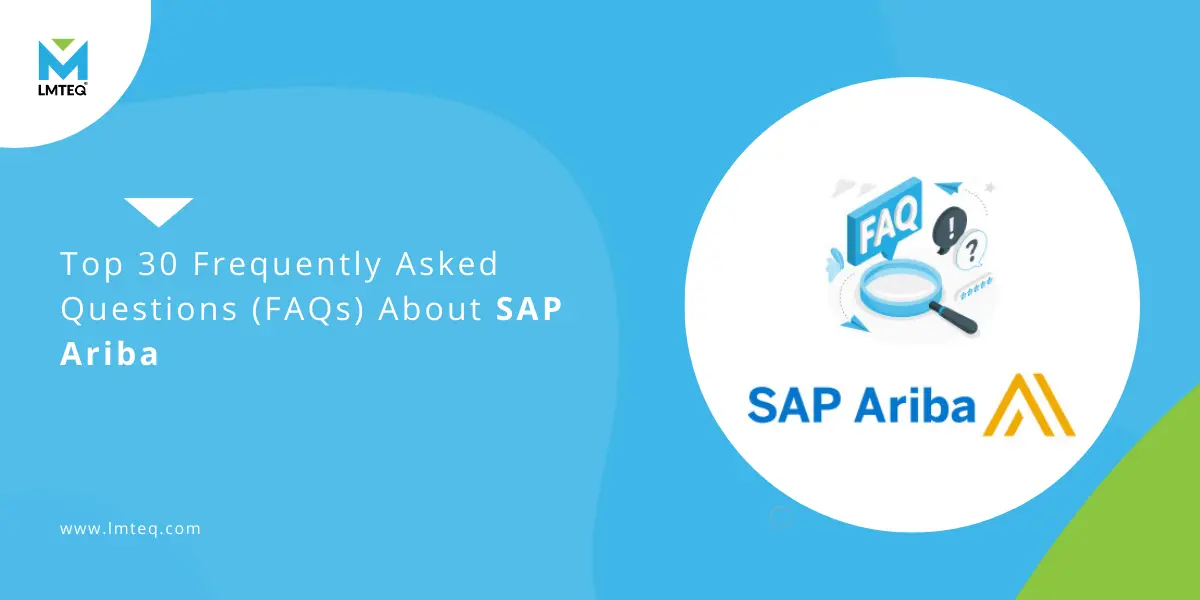According to a recent study by Grand View Research, the sourcing and procurement market in the retail industry is projected to reach an impressive USD 5.82 billion by 2024. This staggering figure highlights the growing importance of effective procurement strategies as businesses strive to optimize supply chains and reduce costs. In this fast-paced landscape, platforms like SAP Ariba have become essential tools for organizations aiming to streamline their procurement operations.
To help you make the most of this powerful solution, we’ve gathered the top 20+ frequently asked questions about SAP Ariba.
Whether you’re just getting started or looking to enhance your procurement processes, these insights will help you navigate SAP Ariba with confidence and efficiency.
30 Questions About SAP Ariba
1. What is SAP Ariba, and how does it work?
SAP Ariba is a cloud-based procurement solution that connects buyers and suppliers in a global network. It facilitates procurement, supply chain management, and contract management by providing tools for sourcing, managing suppliers, and tracking spend. Users can automate purchasing processes, manage risks, and collaborate with suppliers in real-time.
2. What are the key features of SAP Ariba?
SAP Ariba’s key features include sourcing and procurement, supplier management, contract lifecycle management, spend analysis, and guided buying. It offers a collaborative platform for procurement that streamlines processes and improves visibility and compliance.
3. How does SAP Ariba help with procurement processes?
SAP Ariba offers various modules, including Sourcing, Procurement, Contracts, Supplier Management, Spend Analysis, and Financial Supply Chain Management. Each module addresses different aspects of procurement and supply chain operations.
5. How does SAP Ariba integration work with other ERP systems like SAP S/4HANA?
SAP Ariba seamlessly integrates with SAP S/4HANA and other ERP systems through the SAP Cloud Integration Gateway. This allows real-time data synchronization between procurement, finance, and inventory systems, enabling end-to-end supply chain visibility and efficiency.
6. What is the difference between SAP Ariba and other procurement solutions?
SAP Ariba differentiates itself by offering a cloud-based, networked solution that connects millions of suppliers and buyers worldwide. Its integration with SAP S/4HANA and focus on supplier collaboration make it a comprehensive solution compared to standalone procurement tools.
7. What industries benefit most from using SAP Ariba?
Industries such as manufacturing, retail, healthcare, financial services, and public sector organizations benefit from SAP Ariba. It is particularly useful for industries with complex supply chains and procurement needs.
8. What are the pricing models for SAP Ariba?
SAP Ariba offers flexible pricing models based on the specific modules and features a business needs. Typically, pricing is based on transaction volume, user licenses, or subscription fees, which can be customized according to organizational requirements.
9. How do suppliers interact with buyers on SAP Ariba’s Business Network?
Suppliers can register on the SAP Ariba Network to connect with buyers, respond to sourcing events, submit invoices, and manage orders. The platform also allows suppliers to track their performance and collaborate with buyers through a unified interface.
10. What is SAP Ariba Guided Buying?
SAP Ariba Guided Buying is a feature that helps employees easily find and purchase goods and services from preferred suppliers, ensuring compliance with procurement policies. It offers a user-friendly interface, categorized product listings, and integrated approval workflows.
11. What are the benefits of using SAP Ariba for sourcing and procurement?
SAP Ariba streamlines sourcing and procurement by automating processes, improving supplier collaboration, enhancing spend visibility, reducing costs, and ensuring compliance with procurement policies.
12. How does SAP Ariba improve supplier management and collaboration?
SAP Ariba provides tools for onboarding, managing, and evaluating suppliers. It improves collaboration through real-time communication, shared documents, and performance tracking, which helps reduce supply chain risks.
13. What is SAP Ariba Supplier Risk Management?
SAP Ariba Supplier Risk Management helps organizations assess, monitor, and mitigate risks associated with their suppliers. It provides real-time insights into supplier performance, compliance, and financial stability to reduce supply chain disruptions.
14. How does SAP Ariba handle contract management?
SAP Ariba offers a Contract Lifecycle Management module that automates contract creation, negotiation, approval, and storage. It ensures compliance, minimizes risks and enhances collaboration between legal, procurement, and supplier teams.
15. What are the reporting and analytics capabilities in SAP Ariba?
SAP Ariba provides robust reporting and analytics tools, offering insights into spend, supplier performance, and procurement efficiency. It helps organizations make data-driven decisions by leveraging real-time dashboards and predictive analytics.
16. How does SAP Ariba enhance procurement compliance?
SAP Ariba ensures procurement compliance by embedding business rules into its workflows, enforcing policies during purchasing, and offering visibility into contract adherence and supplier qualifications.
17. Can SAP Ariba support global procurement operations?
Yes, SAP Ariba supports global procurement by enabling cross-border transactions, handling multiple currencies, and tax configurations, and ensuring compliance with global trade regulations.
18. How is data security managed within SAP Ariba?
SAP Ariba adheres to stringent security standards, including encryption, role-based access control, and compliance with regulations like GDPR. It provides audit trails, data privacy controls, and secure cloud hosting.
19. What is the process of onboarding suppliers in SAP Ariba?
Supplier onboarding in SAP Ariba is streamlined through automated workflows. Suppliers register, provide documentation, and undergo validation. Buyers can then evaluate and approve suppliers based on predefined criteria.
20. How does SAP Ariba’s Spend Analysis work?
SAP Ariba Spend Analysis aggregates and normalizes spending data from various sources, providing insights into spending patterns, cost-saving opportunities, and supplier performance. It enables procurement teams to optimize their spending strategies.
21. What skills and expertise should a SAP Ariba consultant possess?
A SAP Ariba consultant should have a deep understanding of procurement processes and the SAP Ariba platform, along with skills in:
- Technical Proficiency
- Business Acumen
- Project Management
- Analytical Skills
- Training and Support
22. What SAP Ariba services does LMTEQ offer to its clients?
LMTEQ provides a comprehensive range of services for SAP Ariba, including implementation, configuration, integration with existing ERP systems, and ongoing support to ensure optimal use of the platform tailored to client needs.
23. How does LMTEQ assist with SAP Ariba supplier management?
LMTEQ streamlines the supplier management process by utilizing SAP Ariba’s features to automate workflows, ensuring compliance and data accuracy while facilitating quick and efficient registration and approval of suppliers.
24. Can LMTEQ customize SAP Ariba modules to fit specific business needs?
Yes, LMTEQ specializes in customizing SAP Ariba modules to meet unique business requirements, allowing organizations to leverage the full potential of the platform tailored to their procurement processes.
25. What role does LMTEQ play in SAP Ariba training for clients?
LMTEQ offers detailed training documents for clients, equipping them with the knowledge and skills to effectively utilize SAP Ariba features, enhancing user adoption, and maximizing the benefits of the procurement solution.
26. How does LMTEQ handle the integration of SAP Ariba with other systems?
LMTEQ employs best practices to integrate SAP Ariba with other business systems, ensuring seamless data flow and operational coherence between procurement, finance, and inventory systems, which enhances overall supply chain efficiency.
27. What are the benefits of working with LMTEQ for SAP Ariba implementation?
Working with LMTEQ for SAP Ariba implementation offers businesses access to industry expertise, customized solutions, and comprehensive support, ensuring a successful deployment that aligns with organizational objectives.
28. How does LMTEQ approach ongoing support for SAP Ariba users?
LMTEQ provides ongoing support for SAP Ariba users through dedicated service teams, offering assistance with troubleshooting, system upgrades, and process optimization to ensure continued operational excellence.
29. Can LMTEQ help with data migration to SAP Ariba?
Yes, LMTEQ assists with data migration to SAP Ariba by developing tailored strategies that ensure accurate and secure transfer of data from legacy systems while maintaining data integrity throughout the process.
30. What industries does LMTEQ serve with its SAP Ariba solutions?
LMTEQ serves a variety of industries with its SAP Ariba solutions, including manufacturing, retail, healthcare, and financial services, adapting the procurement capabilities to meet the specific needs and regulations of each sector.
31. How does LMTEQ ensure compliance during the SAP Ariba procurement process?
LMTEQ implements best practices and automated compliance checks within SAP Ariba to ensure that procurement activities adhere to regulatory requirements and internal policies, reducing risk and enhancing transparency.
Related Reads:
Key Takeaway
With SAP ABAP’s strong presence in the procurement software market, it remains the go-to solution for mid-to-large organizations looking for effective sourcing and procurement management.
LMTEQ, as an official SAP partner, leverages its deep industry expertise to deliver tailored SAP implementations, integrations, and customizations.
By collaborating closely with both business and IT teams, LMTEQ ensures that its SAP solutions align perfectly with each client’s unique business requirements and standards, driving efficiency and success across procurement operations.

